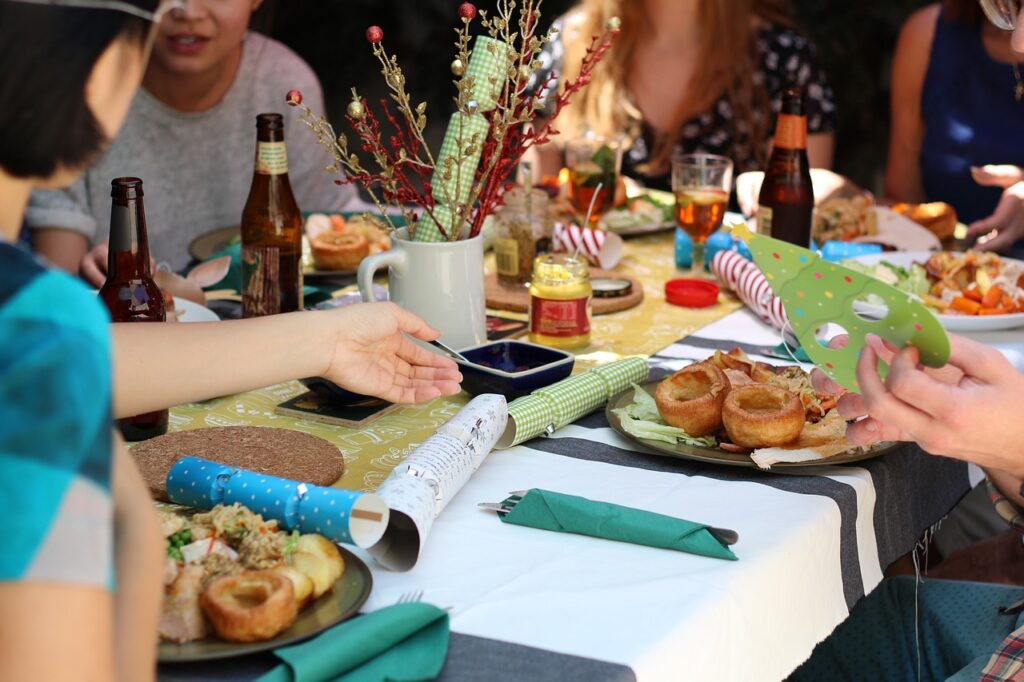Avoiding Family Fights During the Holidays
One of the best parts of the holidays is reuniting with people we love, but family fights are sometimes unavoidable. That is because our closest relationships are also the people with the greatest power to hurt our feelings—precisely because we care about their opinions the most. How can we prevent divided viewpoints from causing family fights during the holidays? How do we make sure our time together brings us closer instead of dividing us? Here I share three simple steps to keep peace
Avoiding Family Fights. Tip #1- Set an Intention for Your Family Gathering.
Ask yourself, “What do I want to accomplish during this gathering?” Perhaps your answer is something similar to mine, “My intention is to share deep love and make new memories.” Or maybe it is “To have some delicious food and a good time.” Perhaps it’s something even more serious, such as “To mend a little my relationship with X family member”
Just by setting a clear intention, you recruit unconscious brain power and universal forces to help you accomplish it. But there’s more! Your intention can become a mantra or slogan you repeat to yourself or paraphrase as needed for others to remind them and yourself what’s really important when family fights appear on the horizon . So, when Uncle X brings out his political talk again, you smile and answer, “I’m not here to talk about politics, I’m here just to have a great meal and have a good time with people I care for.

Pro Tip:
Write your intention in first person, and present tense. “I am having some delicious food and a good time with people I care for.”
Pro Tip 2
Even more importantly: use only positive terms. Don’t say “I’m avoiding family fights” or “My intention is not to strangle uncle X if he brings out his political talk again.” Instead say something like “I am enjoying peaceful time with family, agreeing to disagree and focusing on our common interests.”
Avoiding Family Fights. Tip #2: Create a Love and Gratitude Anchor for Each Person You’ll Meet, (Especially those who tend to push your buttons).
This is easier than it sounds, and you can do it within seconds and you can do it on the go, as you greet them. What do I mean with this? Here’s an example.
Ahead of the reunion, go back in your mind to your happiest/most loving memory of this person. It can be something they said or did for you that you’re grateful for, or it can be a moment of pure fun you shared together.

Evoke the image of that day, or an image of your family member at age three. But don’t worry if you’re not a visual person and instead are more of an auditory or kinesthetic person. If that’s the case, just remember what you heard or how you felt physically at the time. Then, hold on to that memory for about ten seconds, savoring that feeling.
How to Apply this Tip:
Did you notice how good that feels? It would be worth practicing just for that! But there’s more. As you savor the memory, come up with a subtle movement you’ll do to “anchor” that feeling. It can be touching your heart, or lacing your fingers, or closing your eyes for a second. From now on, that is your “secret ninja move” to evoke that pleasant moment.
Whenever your loved one is not being the best version of themselves, do that movement, invoke that memory and “switch lenses.” See yourself stepping into a more loving view of them and, if needed, smile and repeat your mantra.
Avoiding Family Fights. Tip #3: Hope for the Best, Surrender to the Worst.

Our chances of making something happen are much greater if we know ahead of time what we want and visualize it. Would you like this Thanksgiving to be an opportunity to mend a strained relationship with someone? Imagine it happening.
Is your best case scenario to survive the night without yelling at your stepchild? Close your eyes and see the scene play in your mind.
Here you may say, “Isn’t this setting myself for disappointment if that scene doesn’t happen?” My answer is: no, as long as you keep your best-case scenario as something that depends on you.
The Power is in You—but only in what You can control
Your ultimate dream may be that your estranged sister re-appears, falls on her knees and asks the entire family forgiveness for her past offenses—but that doesn’t depend on YOU.
In the same way, it doesn’t depend on you whether Mom remembers great childhood stories to tell you, or whether Uncle X keeps chasing you all over the house the first thirty times you tell him you’re not there to talk about politics.
Instead of setting yourself up for disappointment by trying to control how people will respond to you, what can you visualize/dream of that depends on YOU and no one else?
“I will take a moment to hug each and everybody and tell them I’m glad they’re here.”
“I will ask my mother for some stories of when I was little to share with my kids.”
“I will remain peaceful even when Uncle X brings out his conspiracy theories.”
See the difference?
By putting your focus on what you can control in your best-case scenario, (YOU and YOUR responses) you save yourself unnecessary grief about others not “performing” in a particular way.

Remember: we’re not movie directors, we’re a bunch of improv comedians—hopefully having fun. You’re not there to dictate what’s going to happen, you’re there to_________ (Insert your intention).
Taking the Challenge to the Next Level

These are the simplest steps you can apply to avoid family fights. But I admit these work best if you already have a good base in your relationship with your family. How about when emotions are so high, we get blinded and can’t remember what to do? How about when relationships are toxic, or when decades of negative history have accumulated? That is a topic beyond a blog post. It would take formal training and some healing.
I’d be glad to help you with that. Just shoot me an email or book a consultation, so we can talk.
Love,
❤️Diely
If You Enjoyed This Post, Please Share it by copying and pasting the URL Link: https://joyfullysuccessful.com/avoiding-family-fights-during-the-holidays/



